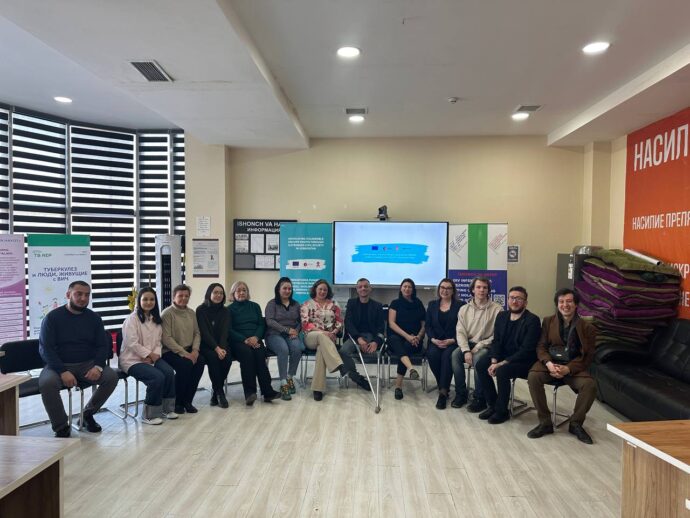
Author: Irma Kakhurashvili, Georgia
A middle-aged man comes into a dental clinic and explains to the dentist that he is HIV-positive. The dentist refuses to treat the patient. Under the rules, the doctor must sterilize all instruments and the patient is not obligated to inform about the diagnosis, but the patient is being honest and is ‘punished’ by the dentist for it. The man asks the doctor what he is to do, where to turn. The doctor’s response is that it is none of his concern. The dentist is not aware he is being recorded with a hidden camera…
As reported by the Infectious Diseases, AIDS and Clinical Immunology Research Centre, around 600 to 700 new HIV cases are registered in Georgia annually. Although every citizen is able to receive publicly-funded free treatment, this is insufficient to end HIV. NGO Real People, Real Vision is a member of East Europe and Central Asia Union of People Living with HIV (PLHIV), which has implemented interesting projects on prevention, support and mobilization of people involved in HIV treatment. Discrimination and stigmatisation of HIV-positive people is just one of the problems obstructing prevention of HIV epidemic in Georgia. This and other topics are part of our conversation with Lasha Tvaliashvili, the initiator of multiple video-experiments and the Executive Director of Organization of PLHIV Real People, Real Vision.
– Lasha, in your opinion, what is the greatest achievement in the field of HIV/AIDS treatment?
– For instance, the fact that during the past two years there has not been a single case of mother-to-child transmission. This is a result of daily efforts of the AIDS Centre, which does not even have its own building. The Centre operates under critical conditions, resulting in serious violations of rights of patients and medical staff, violation of sanitary, epidemiological and other norms. There is not enough space where an HIV-positive person could receive all services. There can be no talk of anonymity when there is one office where two physicians are seeing two patients at the same time. Government entities promised to allocate premises to the Centre but never did. Such attitude puts the existence of this strategic medical facility into question.
– Is late testing the main reason for the increase in the number of new cases? Is that the only reason?
– Many patients come to the Centre already with clearly marked symptoms. Of course, timely testing followed by therapy would have protected them from various illnesses. However, lack of awareness among the population is not the only reason; it also concerns approaches of medical staff. I still hear stories about doctors, who keep treating patients for various illnesses for years, and it does not occur to them to refer patients for HIV testing.
Nevertheless, there has been a positive trend. When friends and family find out about the status of a close person, they treat that person with more sympathy than it used to be in the past. However, I am puzzled at the situation with medical staff, when sizeable finances are invested in their education… The level of discrimination and stigmatisation is high in Georgia. Several days ago, one of the micro-lending organizations requested HIV test results from its employees. Should the test be positive, the employee must leave, which is a direct stigma. Regular work at the office with zero risk of HIV transmission shall not be equivalent to cruel treatment of people.
 – What stands in the way of defending rights of patients who have lost their jobs?
– What stands in the way of defending rights of patients who have lost their jobs?
– The patients themselves. At first, the discriminated person feels insulted, but then emotions quiet down and he or she refuses to continue the argument in a courtroom. People are afraid of publicity of their positive status. They are not sure they will continue on living peacefully. They are afraid of complicating their public position. For reasons above, such precedents are not made public, thus increasing discrimination.
– What is your view on treatment availability in Georgia from geographic standpoint?
– HIV/AIDS more frequently occur in socially lower-standing population segments. These people often live in regions without AIDS Centres. For instance, patients from Samtskhe–Javakheti region go to Tbilisi for medications once a month. The same is also true for a huge region of Kakheti, Guria, Racha, and Svaneti. Treatment must be continuous, and every month patients travel long distances. It is harder in winter when roads in mountainous areas are closed. AIDS Centres are located in big cities only – Tbilisi, Kutaisi, Zugdidi and Batumi.
– Please share your experience about the lowest-budget but effective project.
– In 2012-2013, we had a project that saved 300 patients. Throughout the year our activists were on duty at the AIDS Centre. During registration of new cases, when patients were most shocked at the test results, our activists tried to explain in a non-medical language about HIV/AIDS, and further assisted in the course of treatment. Throughout the year 10% of patients diagnosed with AIDS did not return to the Centre. The project objective was not to lose those 10%. The project budget was 10 thousand US Dollars, but above that, we have found a lot of like-minded fellows and friends, some of whom even got married. This project was implemented jointly with the HIV/AIDS Patients’ Support Foundation. Currently, we are thinking about a new project – psychological and moral support for those convicted persons, who found out about their status in prison. I am confident this will be a humane and successful project.




